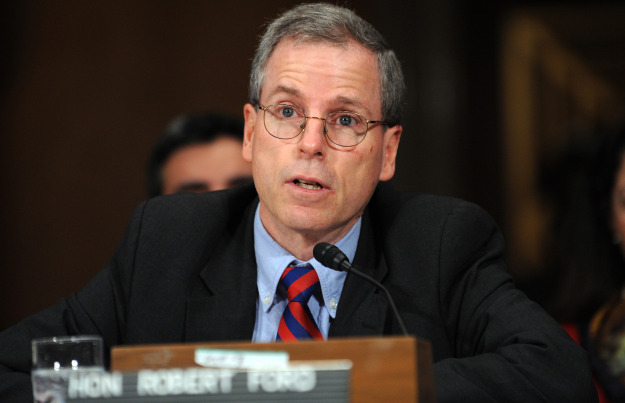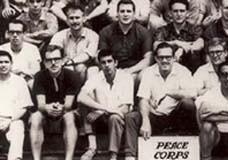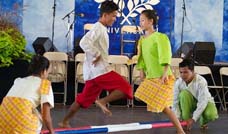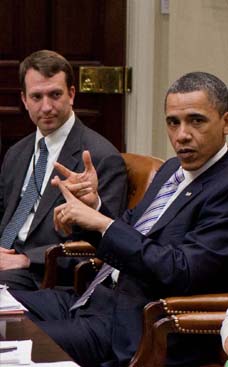
Damascus is for Ford the unexpected climax of 26 years in the Foreign Service. Captivated by the movie Lawrence of Arabia as a boy in Denver, he fell in love with the romance of the Arab world. He went to Morocco with the Peace Corps, studied Arabic at American University in Cairo, joined the State Department. (He speaks Arabic, a beautiful but ferociously difficult language, fluently enough to mimic local dialects.) At 53, he's one of the State Department's experts on the Arab world, with postings from Algeria to Bahrain. "I find the culture endlessly fascinating," he says. Ford hadn't expected the Arab Spring. "Everyone knew there was seething unrest, had been for years," he says. "Nobody could predict when those frustrations would boil over." The brushfire spread of upheavals he credits to the rise of independent Arab TV channels. "Satellite dishes are everywhere. People have alternative sources of information now. So they know when their governments are lying to them."
Morocco RPCV Robert Ford is America's Man in Syria, quietly demonstrating how to use diplomatic force against oppressive regimes
Damascene Diplomat
Sep 25, 2011 10:00 AM EDT
America's man in Syria has been quietly demonstrating how to use diplomatic force against oppressive regimes.
They were one door away from disaster. Syrian "demonstrators" were besieging the U.S. Embassy in Damascus. Busloads of them had arrived promptly at 8:30 that morning. The crowd hurled stones to smash the windows, while a team of young men hoisted themselves with suspiciously military skill over the high compound wall, scaled the building, tore down the American flag, and were now trying to break into the secure core of the embassy where Ambassador Robert Ford and his staff were in lockdown. On the other side of the door, the embassy's Marine guards waited, rifles leveled. Ford phoned the chief of staff of the Syrian Foreign Ministry. "If that door opens the Marines will shoot-and it will be your responsibility," he said. His warning had effect; the police, who had been standing by passively, began to disperse the demonstration.
The assault on the embassy in July was, in its way, a compliment. A few days before, Ford had visited the city of Hama. "The protests there were very peaceful," he says, "but there were rumors the government was planning a violent crackdown. I thought it was important to show that the world outside Syria was watching." Hama greeted Ford like a rock star. The attack on the embassy was the Syrian regime's way of venting its displeasure. "It showed we were getting their attention," Ford says.
Through a decade dominated by wars in Iraq and Afghanistan, American diplomats have been relegated to a back seat. Soldiers are such photogenic symbols of U.S. might. But in Damascus, Ambassador Ford and his team have been demonstrating another face of American power: a quiet determination to bear witness as Syrian President Bashar al-Assad commits his regime to lethal suppression of popular discontent. The U.S. isn't going to send its military into Syria. Ford has found a different weapon-the power of presence.
Damascus is for Ford the unexpected climax of 26 years in the Foreign Service. Captivated by the movie Lawrence of Arabia as a boy in Denver, he fell in love with the romance of the Arab world. He went to Morocco with the Peace Corps, studied Arabic at American University in Cairo, joined the State Department. (He speaks Arabic, a beautiful but ferociously difficult language, fluently enough to mimic local dialects.) At 53, he's one of the State Department's experts on the Arab world, with postings from Algeria to Bahrain. "I find the culture endlessly fascinating," he says.
Mideast Syria US
Ford (center) meets with Assad (far left) in January., SANA-AP
Ford hadn't expected the Arab Spring. "Everyone knew there was seething unrest, had been for years," he says. "Nobody could predict when those frustrations would boil over." The brushfire spread of upheavals he credits to the rise of independent Arab TV channels. "Satellite dishes are everywhere. People have alternative sources of information now. So they know when their governments are lying to them."
When he arrived in Damascus in January, he was the first U.S. ambassador there since 2005. After five grueling years in Iraq, a posting to Syria promised relative quiet. His uphill mission was to persuade the regime to reverse course on a host of policies. A month later, Syria saw its first small demonstration. Ford recalled how the protests in Cairo had begun: "I thought: it could happen here, too," he says. Seven months later, human-rights groups reckon, more than 3,000 Syrians have been killed by the regime. Ford has evacuated half his embassy staff and all families. He travels nowhere without bodyguards.
After his visit to Hama, the regime forbade diplomats to travel outside Damascus. Ford ignored the ban. Other Western envoys joined him. Eight ambassadors arrived this month at the wake for Ghayath Mattar, father of the Syrian nonviolent protest movement. "Mattar had been in hiding, but in the end the police found him. He was tortured to death," Ford says. Of the ambassadors' visit, he says: "We all went together to make our condolences and to show support for the principle of nonviolent protest." On the embassy's Facebook page and website, Ford can bypass censorship to talk to any Syrian who cares to log in-including regime supporters.
Ford doesn't believe Assad will agree to reforms and thinks it's only a matter of time before the regime falls. He sees "not fissures but perhaps cracks" opening in the ruling elite. Assad's two regional allies, Turkey and Iran, are urging change; the international sanctions will further damage an economy that, Ford says, is already showing signs of collapse.
What happens then? "A more representative government will emerge, I anticipate; but it will take time," he says. Iraq should have taught the West the limits of intervention: "People have to work these things out for themselves. Outsiders cannot impose solutions."
Perversely, Ford may not be in Damascus when the regime does fall. GOPers in the Senate, disapproving of any links to Syria, have refused to confirm his posting. He's due to come home before Christmas.
















